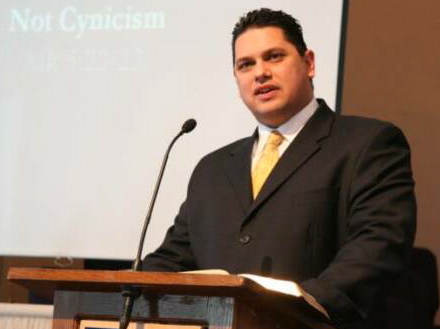Rising above poverty and the background of a broken home, associate professor Freddy Cardoza has come to enrich Biola with his passion for urban ministry.
Cardoza serves the university as chair of the department of Christian education and also teaches Evangelism and Follow-Up, a course instructing students in discipleship as well as personal and church evangelism.
Growing up in Oneida, Tenn., a small town in the Cumberland Plateau of the Appalachian Mountains, he experienced first-hand the challenges of low income areas. Cardoza accepted Christ at age 13, a point in his life when he was searching for answers.
“Basically, the circumstances were that I was an un-churched, desperate young man who was growing up in a broken home, raised in abject poverty, and I was desperate for hope and meaning,” Cardoza said.
Cardoza said he never rebelled in his quest for the truth but maintained a moral lifestyle despite his circumstances.
“I was a moral, upright boy who just was desperate, who didn’t know Jesus,” he said.
He chose to enter Christian education because experiences from his past motivated him to teach others how to apply God’s Word to their own lives.
“Through God’s Word and through proper discipling, because that’s how I got the truth of God’s Word, God put a spiritual rocket on my back and allowed me to just blast through all the baggage of my past and all of the pain … the fear,” said Cardoza of when he accepted Christ. “God used that to say to me that if evangelism and discipleship … can happen in my life in such a desperate place, the power of God can help anybody,” he said.
Cardoza earned his bachelors’s degree in church ministry from Liberty University, his master’s degree from Southeastern Seminary in Christian education and his doctorate in leadership from Southern Seminary.
Cardoza met his wife Kristin while attending Liberty and together they have two sons, Dakota, 13, and Christian, 11.
As a tradition since his sons were old enough to understand, the family has held family devotions every night. Cardoza said he never had that experience while growing up and makes sure that his family holds high values for togetherness, transparency and devotion.
Cardoza is fond of traveling and has ventured with his family through 35 states and parts of Canada. He enjoys outdoor activities such as mountain biking and spelunking (cave exploration) and in his free time is also partial to weight lifting and taking time out for reflection and thought.
Cardoza has been teaching part-time or full-time for the past 12 years. His most recent position before coming to Biola was associate vice president of academics at Midwestern University. He said he left his position because he desired to teach at a university again, not strictly a seminary.
“That’s part of why I came back here because here we have the beauty of having both the seminary and the university with it,” he said. “To be able to be part of a seminary plus a university, not a divinity school … is so amazing.”
Outside of teaching in the classroom, Cardoza is passionate about urban ministry.
“Urban areas figure greatly in God’s Word of bringing the Gospel to the world, and they can be a great force of good or a great force of evil in our world,” said Cardoza, who finds a biblical foundation for his outreach to urban areas in Paul’s ministry in Acts.
“Great cities give great opportunities,” Cardoza said.
He has also worked with a team in Chicago to start a private Christian school in the urban area of Chicago and began a ministry called Chicago Hope, which provides food, clothing and ministries to those in need.
To students who may be struggling from harsh backgrounds, Cardoza shares advice from his own experience.
“I think what I would say to them is that the crucible of pain that their life has been up until now, that God can redeem every bit of that pain and use a place like this to forge them into a very strong instrument for His Kingdom if they’ll hold on,” he said. “And if they won’t hold on, they’ll become another statistic.”







